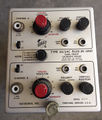C: Difference between revisions
(New page: * http://w140.com/tek_fcp/tek_type_c_factory_cal_proc.pdf) |
No edit summary |
||
| (26 intermediate revisions by 6 users not shown) | |||
| Line 1: | Line 1: | ||
* http://w140.com/tek_fcp/tek_type_c_factory_cal_proc.pdf | {{Plugin Sidebar 2 | | ||
title=Tektronix Type (53)C | | |||
summary=Dual-trace 8.5 (24) MHz amplifier | | |||
image=53-54c-crop.jpg | | |||
caption=Tektronix Type C (later version) | | |||
series=[[500-series scopes]] | | |||
introduced=1954 | | |||
discontinued=1959 | | |||
manuals= | |||
<!-- * [http://w140.com/tek_fcp/tek_type_c_factory_cal_proc.pdf Factory calibration procedure] --> | |||
* [http://w140.com/tek-53_54c.pdf Tektronix Type 53/54C Manual (PDF, needs OCR)] | |||
* [[Media:tek_type_c_fcp.pdf| Tektronix Type C Factory Calibration Procedure (PDF, OCR)]] | |||
* [[Media:Tek 53c cal procedure.pdf|Tektronix Type C Calibration Procedure (PDF, OCR)]] | |||
}} | |||
:''Actually, there never was a Type C, but that name is sometimes used as shorthand for the official "Type 53C" and "Type 53/54C" nomenclatures.'' | |||
The '''Tektronix Type 53C''' is a dual-trace plug-in for [[500-series scopes]]. | |||
It was [[introduced in 1954|introduced]] along with the [[531]] and [[535]] mainframes in 1954. | |||
It is very possibly the first dual-trace scope or plugin ever. | |||
==Specifications== | |||
In the 53x scopes (Tek never documented its performance in the 540's), | |||
its bandwidth is 8.5 MHz, and like most letter-series plug-ins, | |||
its maximum vertical sensitivity is 50 mV/div. Unlike the Type [[A]] | |||
and Type [[B]], the Type C had the ability to invert the signal | |||
before display. | |||
Type 53C was replaced by Type 53/54C in [[introduced in 1956|1956]] when | |||
the [[541]] and [[545]] were introduced. The Type 53/54C's | |||
bandwidth is 24 MHz in those scopes. In [[introduced in 1959|1959]] it | |||
was replaced by [[CA|Type CA]]. | |||
==Internals== | |||
At 15 tubes, the Type 53/54C and Type CA have the highest | |||
tube count of any letter-series plug-in. Each channel consists | |||
of a [[6AK5]] cathode-follower driving a [[12AU6]] differential pair | |||
which drives a [[6AU6]] differential pair. The two channels | |||
converge on a [[12AT7]] cross-coupled cathode-follower. Four | |||
more tubes, a [[6AL5]] and three 12AT7's, comprise a logic circuit | |||
which determines which channel drives the output at any | |||
given moment. The options are A, B, CHOPPED, and ALT. | |||
==Links== | |||
* [http://www.radiomuseum.org/r/tektronix_dual_trace_plug_in_pre_a.html 53C @ radiomuseum.org] | |||
* [http://www.vintagetek.org/wp-content/uploads/2011/10/Tek-series-500-development.pdf How the Tek 500 series came together] | |||
==Pictures== | |||
<gallery> | |||
C_early_1.JPG|53C-Plugin´s Front | |||
C_early_2.JPG|53C-Plugin´s chassis | |||
C_early_3.JPG|53C-Plugin´s chassis side | |||
C later 1.JPG|53/54C-Plugin´s front | |||
IMG 0949.JPG|53/54C-Plugin´s chassis | |||
C later 3.JPG|53/54C-Plugin´s chassis bottom | |||
Tek c schem.png | Schematic diagram | |||
Tek 53-54c 1.jpg|53/54C | |||
Tek 53-54c 2.jpg|53/54C | |||
Tek 53-54c 3.jpg|53/54C | |||
Tek 53-54c 4.jpg|53/54C | |||
Tek 53-54c 5.jpg|53/54C | |||
Tek 53-54c 6.jpg|53/54C | |||
Tek 53-54c right.png|53/54C | |||
Tek 53-54c left.jpg|53/54C | |||
</gallery> | |||
[[Category:500 series plugins]] | |||
Revision as of 17:59, 3 May 2021
- Actually, there never was a Type C, but that name is sometimes used as shorthand for the official "Type 53C" and "Type 53/54C" nomenclatures.
The Tektronix Type 53C is a dual-trace plug-in for 500-series scopes. It was introduced along with the 531 and 535 mainframes in 1954. It is very possibly the first dual-trace scope or plugin ever.
Specifications
In the 53x scopes (Tek never documented its performance in the 540's), its bandwidth is 8.5 MHz, and like most letter-series plug-ins, its maximum vertical sensitivity is 50 mV/div. Unlike the Type A and Type B, the Type C had the ability to invert the signal before display.
Type 53C was replaced by Type 53/54C in 1956 when the 541 and 545 were introduced. The Type 53/54C's bandwidth is 24 MHz in those scopes. In 1959 it was replaced by Type CA.
Internals
At 15 tubes, the Type 53/54C and Type CA have the highest tube count of any letter-series plug-in. Each channel consists of a 6AK5 cathode-follower driving a 12AU6 differential pair which drives a 6AU6 differential pair. The two channels converge on a 12AT7 cross-coupled cathode-follower. Four more tubes, a 6AL5 and three 12AT7's, comprise a logic circuit which determines which channel drives the output at any given moment. The options are A, B, CHOPPED, and ALT.
Links
Pictures
-
53C-Plugin´s Front
-
53C-Plugin´s chassis
-
53C-Plugin´s chassis side
-
53/54C-Plugin´s front
-
53/54C-Plugin´s chassis
-
53/54C-Plugin´s chassis bottom
-
Schematic diagram
-
53/54C
-
53/54C
-
53/54C
-
53/54C
-
53/54C
-
53/54C
-
53/54C
-
53/54C














